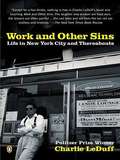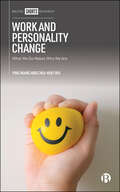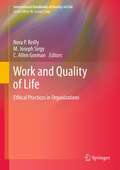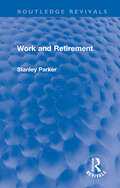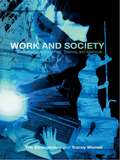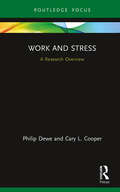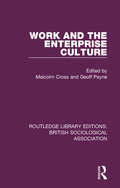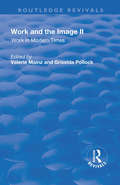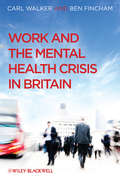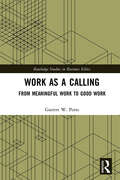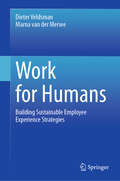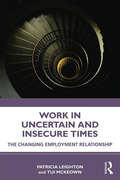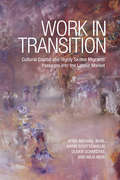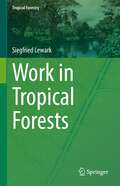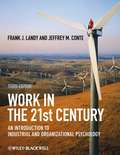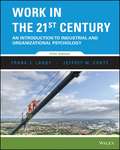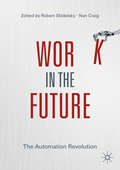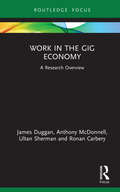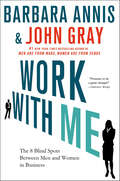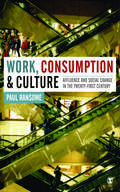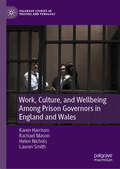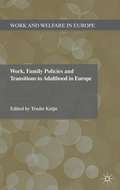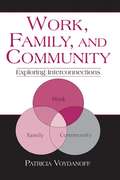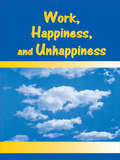- Table View
- List View
Work and Other Sins: Life in New York City and Thereabouts
by Charlie LeduffFrom the New York Times bestselling author of Detroit: An American Autopsy"Except for a few drinks, nothing is free in Charlie LeDuff's blunt and touching Work and Other Sins. The laughter and wisdom are hard won, the lessons are often painful... the sad tales and wit from the bar rail are endless and timeless." --The New York Times Book ReviewCharlie LeDuff is that rare breed of news reporter--one who can cover hard-to-get-at stories in a unique and deeply personal style. In Work and Other Sins, he gives his incomparable take on New York City and its denizens--the bars, the workingmen, the gamblers, the eccentrics, the lonesome, and the wise. Whether writing about a racetrack gambler, a firefighter with a broken heart, or a pair of bickering brothers and their Coney Island bar, LeDuff takes the reader into the lives of his subjects to explore their fears, faults, and fantasies as well as their own small niches of the globe. The result is an at turns riotous, dirt-under-the-nails, contemplative, salty, joyous, whiskey-tinged, and utterly unique vision of life in the Big Apple.
Work and Personality Change: What We Do Makes Who We Are
by Ying Wang Chia-Huei WuCan your job change your personality? While traditionally personality has been considered fixed and stable, recent thinking indicates that this is not the case. Personality can be changed by various work and vocational experiences, such as employment conditions, career roles, job characteristics and training or interventions. Drawing on a wide array of research in the field, Wang and Wu provide a conceptual overview on how personality can be changed at work by societal, organisational and job-related factors, while considering how individuals can take an active approach in changing their personality at work.
Work and Quality of Life
by M. Joseph Sirgy C. Allen Gorman Nora P. ReillyEmployees have personal responsibilities as well as responsibilities to their employers. They also have rights. In order to maintain their well-being, employees need opportunities to resolve conflicting obligations. Employees are often torn between the ethical obligations to fulfill both their work and non-work roles, to respect and be respected by their employers and coworkers, to be responsible to the organization while the organization is reciprocally responsible to them, to be afforded some degree of autonomy at work while attending to collaborative goals, to work within a climate of mutual employee-management trust, and to voice opinions about work policies, processes and conditions without fear of retribution. Humanistic organizations can recognize conflicts created by the work environment and provide opportunities to resolve or minimize them. This handbook empirically documents the dilemmas that result from responsibility-based conflicts. The book is organized by sources of dilemmas that fall into three major categories: individual, organizational (internal policies and procedures), and cultural (social forces external to the organization), including an introduction and a final integration of the many ways in which organizations can contribute to positive employee health and well-being. This book is aimed at both academicians and practitioners who are interested in how interventions that stem from industrial and organizational psychology may address ethical dilemmas commonly faced by employees.
Work and Retirement (Routledge Revivals)
by Stanley ParkerIn the early 1980s world recession and widespread unemployment had accentuated an existing trend – more people retiring from work early and living longer after doing so. Some were adequately prepared for a life of well-earned ‘leisure’ in retirement, but too many were not. The policies of employers, unions and governments on retirement needed to be challenged in societies where work opportunities were collapsing but where leisure activities and values were not yet strong enough to take their place. Originally published in 1982, Dr Parker, a sociologist, provides a careful and critical examination of what we knew about retirement and discusses possible alternative answers to the various problems involved at the time. The history of retirement is first considered, followed by a conceptual analysis of types of retirement. There are chapters on preparation for retirement, the capacity of older people to work, and on the varying experiences of retirement. Separate consideration is given to the question of work after retirement age and whether retirement is actually experienced as leisure. The concluding chapter examines various policy alternatives for dealing with the problems raised earlier in the book. Work and Retirement was intended for students of industrial sociology and industrial psychology, for personnel and human resource professionals, for trade unionists and for all those who had an interest in understanding the developments in the field of retirement and the older working population. Now it can be read in its historical context.
Work and Society: Sociological Approaches, Themes and Methods
by Tim Strangleman Tracey WarrenWork and Society is an important new text about the sociology of work and employment. It provides both undergraduate and postgraduate students of sociology, business and politics, with a firm and enjoyable foundation to this fascinating area of sociology, giving comprehensive coverage of traditional areas of the sub-discipline as well as new trends and developments. The book is divided into three complementary and interconnected sections – investigating work, work and social change and understanding work. These sections allow readers to explore themes, issues and approaches by examining how sociologists have thought about, and researched work and how the sub-discipline has been influenced by wider society itself. Novel features include separate chapters on researching work, domestic work, unemployment and work, and the representation of work in literary and visual media.
Work and Stress: A Research Overview (State of the Art in Business Research)
by Philip Dewe Cary L CooperStress is a leading cause of ill health in the workplace. This shortform book analyses, summarises and contextualises research around stress at work. The book begins by exploring the impact and challenges of technology and the challenging and changing contours and boundaries of the nature of work. Using a behaviour lens, the authors draw on cyberpsychology to illuminate the choices we make to balance life, work and wellbeing. The changing nature of work is analysed, shifting structures and boundaries explored and the stress consequences of such themes as the gig economy and precarious work are also included in the book. A compelling framework for researchers of work, organisation and psychology, this concise book is also valuable reading for reflective practitioners, seeking to understand the importance of wellbeing in the workplace
Work and the Enterprise Culture (Routledge Library Editions: British Sociological Association #12)
by Geoff Payne Malcolm CrossWork and Enterprise Culture examines the world of work in the light of the major changes that have occurred over the last decade. In particular, the book focuses on what is understood by the term the ‘enterprise culture’ and considers what impact, if any, this concept has on traditional work practices. A major feature of the book is that the essays also address questions of equal opportunity on grounds of gender and race, and examine the effects of the coming of the ‘enterprise culture’ has had on these concerns.
Work and the Image: Volume 2: Work in Modern Times - Visual Mediations and Social Processes
by Griselda Pollock Valerie MainzThis title was first published in 2000. Published in two volumes, "Work and the Image" addresses a critical theme in contemporary social and cultural debates whose place in visual representation has been neglected. Ranging from Greek pottery to contemporary performance, and exploring a breadth of geo-national perspectives including those of France, Britain, Hungary, Soviet Russia, the Ukraine, Siberia and Germany, the essays provide a challenging reconsideration of the image of work, the meaning of the work process, and the complex issues around artistic activity as itself a form of work even as it offers a representation of labour. With a shared focus on the 20th century, the era of modernity and its postmodern aftermath, the essays in this volume examine the diverse ways in which the social relations of work in industrial societies from both capitalist and socialist regimes were publicly and privately mediated by changing forms of visual representation. The authors discuss traditional analyses of the image of the worker in the light of contemporary critical theories that address the question of the subjectivity of the worker in relation to class, gender, nationhood and the concept of modernity.
Work and the Mental Health Crisis in Britain
by Carl Walker Ben FinchamBased on recent data gathered from employees and managers, Work and the Mental Health Crisis in Britain challenges the cultural maxim that work benefits people with mental health difficulties, and illustrates how particular cultures and perceptions can contribute to a crisis of mental well-being at work. <P><P> Based on totally new data gathered from employees and managers in the UK Presents a challenge to much of the conventional wisdom surrounding work and mental health Questions the fundamental and largely accepted cultural maxim that work is unquestionably good for people with mental health difficulties Illustrates how particular cultures of work or perceptions of the experience of work contribute to a crisis of mental well-being at work Fills a need for an up-to-date, detailed work that explores the ways that mental health and work experiences are constructed, negotiated, constrained and at times, marginalised Written in a style that is detailed and informative for academics and professionals who work in the mental health sphere, but also accessible to interested lay readers
Work as a Calling: From Meaningful Work to Good Work (Routledge Studies in Business Ethics)
by Garrett W. PottsAmidst the exponentially growing interest in "work as a calling," contemporary discussions have taken an individualistic turn away from the earlier prosocial character that once marked this orientation to work. Now, discussions about "work as a calling" mostly prioritize personal fulfilment via the pursuit of deeply "meaningful work." Excessive focus has been placed on the experience of meaningful work in ways that are detached from the genuinely good workplace ends that allow for such a meaningful experience to ensue. This book provides a novel paradigm for reimagining the idea of "work as a calling," which serves as a corrective that better supports the individuals’ search for meaning and their contribution to the common good, arguing that the two go hand in hand, and so they cannot be separated. Thus, the key idea captured herein is not simply that scholars have misunderstood the very notion of "work as a calling" by implying that it is essentially just synonymous with meaningful work, but, even more importantly, the point is that scholars and laypersons alike often fail to realize how true meaning ensues as a result of a genuine concern for contributing to human flourishing and the common good through one’s work. Providing a new perspective on "work as a calling" by examining the issue from the perspective of morality rather than self-actualization, this volume will be of interest to researchers, academics, professionals, and students in the fields of business ethics, management, leadership, and organizational studies.
Work for Humans: Building Sustainable Employee Experience Strategies
by Dieter Veldsman Marna van der MerweThis book offers an innovative exploration of the emerging field of employee experience (EX), a vital aspect of human resources. It provides a comprehensive overview of the field’s landscape and unpacks the pressing challenges influencing perspectives on EX and its implications for theory and practice. This book contributes an in-depth, holistic employee experience design methodology for people practitioners and provides a framework for implementing EX strategies within organizations. Beyond its theoretical contribution, the volume contributes rich practical insights through applied case studies that showcase real-world application of the employee experience design methodology and framework. It also proposes a direction for the field in the future of work. Key areas of coverage include: Impact of consumer and human-centric movements on people and HR practices. Challenges within the employee experience field. A practical EX design methodology and its underpinning theoretical concepts. Impact of employee experience through a multitiered measurement approach. Developing an employee experience strategy and capability within organizations. Work for Humans is a must-read for researchers, academics as well as professionals in industrial and organizational psychology, human resource management and development, organizational leadership, and all behavioral and social science-related disciplines.
Work in Challenging and Uncertain Times: The Changing Employment Relationship
by Patricia Leighton Tui McKeownThis book was written as the Coronavirus (COVID-19) pandemic began to have a devastating effect on employment across the globe. The crisis has served to highlight many deepseated, often longstanding challenges to employment relationships. These include uncertainties and fears about the impact of technological advances, concerns about safety and wellbeing and controversies around emerging business and employment models. It is difficult to avoid the fear that the combination of these and other practices will lead to a ‘race to the bottom’. The book calls for a radical rethink and reassessment of the core values underlying employment relationships. In Work in Uncertain and Insecure Times, the authors take a refreshingly realistic view of how contemporary work relationships are managed and look to how they will need to change in the future. Some key questions are posed, such as ‘who is the employer in complex skills supply chains?’; ‘how do we ensure a skilled workforce in a context of fragmentation and increasing individualization?’; ‘in a context of AI, robots etc., what does it mean to be human?’ and ‘how do we achieve change and improvement’? Based on extensive research presented in an accessible and engaging style, the book provides insights valuable to students of employment relationships, HRM and employment law as well as to practitioners and policy-makers. It draws on a range of academic disciplines and thoughts from interviews with key practitioners and commentators on workplace as well as students.
Work in Transition
by Arnd-Michael Nohl Anja Weiss Oliver Schmidtke Karin SchittenhelmDespite the fact that many countries target highly skilled migrants for recruitment in the global labour market, few of those migrants are able to take full advantage of their educational and professional qualifications in their new homes. Work in Transition examines this paradox, using extended narrative interviews that focus on the role that cultural capital plays in the labour market.Comparing the migrant experience in Germany, Canada, and Turkey, Work in Transition shows how migrants develop their cultural capital in order to enter the workforce, as well as how failure to leverage that capital can lead to permanent exclusion from professional positions. Exposing the mechanisms that drive inclusion and exclusion for migrants from a transatlantic comparative perspective, this book provides a unique analytical approach to an increasingly important global issue.
Work in Tropical Forests (Tropical Forestry)
by Siegfried LewarkThis book presents a synopsis, with an innovative approach, of abundance, types and conditions of work performed in the tropical plantation and natural forests. It covers work of formally and informally employed, and of own-account small-scale forest users, women and children. Activities in tree harvesting are analyzed, also on-site conversion by pitsawing, planting and pruning. The abilities of the workers and their efforts while fulfilling their tasks, resulting in performance and workload, are described with many examples of published studies. Influencing variables from organizational, technical and managerial sides are considered as much as included in the studies. The detailed descriptions demonstrate the methodical state of ergonomic research. For better understanding of the coverage the background of the development of forest work science is described. The lasting influence of Taylorism and the roles of ILO and FAO as well as NGOs, e.g. in certification, are pointed out.
Work in the 21st Century: An Introduction to Industrial and Organizational Psychology
by Frank J. Landy Jeffrey M. ConteIn the first two editions of our book, we pursued the premise that the world of work in the 21st century was very different from what it had been as recently as 15 years ago. That premise is even more relevant today and worth repeating. Today's workplace is technological and multicultural.
Work in the 21st Century: An Introduction to Industrial and Organizational Psychology
by Frank Landy Jeffrey ConteWork in the 21st Century, 5th Edition by Frank J. Landy and Jeffrey M. Conte, ties together themes such as diversity, mental and physical ability, personality, interpersonal skills, emotional intelligence, and evidence-based I-O psychology in a way that explores the rich and intriguing nature of the modern workplace. The 5th edition places an emphasis on the technological and multicultural dynamics of today's workplace. This edition retains the 14-chapter format and the 4-color design, which brings I-O psychology to life, especially with the use of newsworthy color photographs. This text is an unbound, three hole punched version.
Work in the Future: The Automation Revolution
by Robert Skidelsky Nan CraigThis short, accessible book seeks to explore the future of work through the views and opinions of a range of expertise, encompassing economic, historical, technological, ethical and anthropological aspects of the debate. The transition to an automated society brings with it new challenges and a consideration for what has happened in the past; the editors of this book carefully steer the reader through future possibilities and policy outcomes, all the while recognising that whilst such a shift to a robotised society will be a gradual process, it is one that requires significant thought and consideration.
Work in the Gig Economy: A Research Overview (State of the Art in Business Research)
by Ronan Carbery James Duggan Anthony McDonnell Ultan ShermanThroughout the last decade, the ‘gig economy’ has emerged as one of the most significant developments in the world of work. As a novel, hyper-flexible form of labour, gig work features a uniquely fragmented working arrangement wherein independent workers partner with digital platform organisations to provide a range of on-demand services to customers. Work in the Gig Economy: A Research Overview provides a concise overview to the key themes and debate that encompass the gig economy literature. It covers five core themes: an introduction to gig work; classification issues; the role of technology; the experiences of gig workers; and the future of gig work. As an emerging and diverse research field, contributions stem from an array of perspectives including psychology, sociology, human resource management, legal studies, and technology management. The chapters synthesise the most prominent insights into this emerging field, key thinking on the complex relationships and conditions found in gig work, and the most significant issues to be addressed as the gig economy continues to develop. A critical introduction for students, scholars and reflective professionals and policymakers, this book provides much needed direction through the rapidly growing and expansive body of research on work in the gig economy.
Work with Me: The 8 Blind Spots Between Men and Women in Business
by John Gray Barbara AnnisWork with Me is the timely collaboration of two of the world's foremost authorities on gender relations—Barbara Annis and John Gray. Here they team up to resolve the most stressful and confusing challenges facing men and women at work, revealing, for the first time, survey results of over 100,000 in-depth interviews of men and women executives in over 60 Fortune 500 companies. Readers will discover the 8 Gender Blind Spots: the false assumptions and opinions men and women have of each other, and in many ways, believe of themselves. Also unveiled are the biology and social influences that compel men and women to think and act as they do, and direct how they communicate, solve problems, make decisions, resolve conflict, lead others, and deal with stress, enabling them to achieve greater success and satisfaction in their professional and personal lives. Work with Me is the definitive work-life relational guide, filled with "ah-ha!" moments and discoveries that will remove the blind spots and enable men and women to work and succeed together.
Work, Consumption and Culture: Affluence and Social Change in the Twenty-first Century
by Dr Paul RansomeThe central question in Work, Consumption and Culture is whether consumption has now displaced production as the defining factor in the lives of those in the industrialized West. This book offers a comprehensive review of the key issues in the production/consumption debate, and where it might lead in the future. Key to Paul Ransome's argument is the hypothesis that affluence is the crucial factor in the shift away from work and towards consumption. Uniquely emphasizing the links between work, consumption and culture, rather than keeping each element separate, the author looks at: - the changing significance of work in society - the meaning, growth and significance of affluence - the growing importance of consumption as a source of identity and its implications the impact of the shift to consumption on work/life balance Work, Consumption and Culture engages the reader with its lively debating style. It is an essential introduction for sociology and cultural studies students on courses relating to consumption and the role of work in contemporary society. `This book offers a balanced account of the changing importance of work and consumption in contemporary industrial society. Clearly written, the author identifies the central role that affluence plays in the relationship between work and consumption, and in the development of social life and individual identity' - Professor Paul Blyton, Cardiff Business School
Work, Culture, and Wellbeing Among Prison Governors in England and Wales (Palgrave Studies in Prisons and Penology)
by Karen Harrison Lauren Smith Helen Nichols Rachael MasonThis book offers a focused and detailed insight into the health and wellbeing of prison staff, specifically focussing on prison leaders and managers. The authors bring together expertise from psychology, health, law, and criminology, to present a unique multidisciplinary examination of health and wellbeing based on interviews with Prison Governors’ Association members. Examining how the participants described their health and wellbeing at work and at home, the authors reveal dysfunctional culture, disenchantment and disengagement, the heavy weight of expectations and high levels of professional uncertainty relating to the future. It argues that more governor grade specific and arguably mandated support is needed. Recommendations from the book will contribute to improving health and wellbeing amongst the governor work force, feeding into positive outcomes in relation to staff retention and prison expansion challenges.
Work, Family Policies and Transitions to Adulthood in Europe
by Trudie KnijnThis book analyzes how the current generation of young adults enters the labour market and tries to create their own autonomous household, with or without children, exploring questions such as what does it mean to be a young adult in Europe today and what social policies help them to combine work and family life?
Work, Family, and Community: Exploring Interconnections (Applied Psychology Series)
by Patricia VoydanoffResearch in recent decades has proven that the seemingly disparate worlds of family life and the workplace are in fact closely intertwined. Moreover, scholars have begun to recognize the extent to which community life influences the work-family interface, for instance, the lack of fit between school hours and work hours, and assistance provided by community-based child care services. Work, Family, and Community is the first to provide a comprehensive review and analysis of the theoretical and empirical research that has examined the complex interconnections among these domains. This book integrates literature from several disciplines, including sociology, industrial-organizational and occupational health psychology, human development and family studies, management, gender studies, and social work. It documents significant patterns and trends in the economy and looks at the health of communities and neighborhoods, exploring the level of social integration, availability of community services, and the extent to which such services meet the needs of working families. Author Patricia Voydanoff takes an important step in conceptualizing the components and processes that comprise the work-family-community relationship, and provides direction for future theoretical and empirical work on the topic. This volume speaks to scholars, researchers, and students who address the theoretical, empirical, and policy-relevant issues associated with the work-family-community interface.
Work, Happiness, and Unhappiness
by Peter WarrAward-winning psychologist Peter Warr explores why some people at work are happier or unhappier than others. He evaluates different approaches to the definition and assessment of happiness, and combines environmental and person-based themes to explain differences in people’s experience. A framework of key job characteristics is linked to an account of primary mental processes, and those are set within a summary of demographic, cultural, and occupational patterns. Consequences of happiness or unhappiness for individuals and groups are also reviewed, as is recent literature on unemployment and retirement. Although primarily focusing on job situations, the book shows that processes of happiness are similar across settings of all kinds. It provides a uniquely comprehensive assessment of research published across the world. Initial chapters explore the several meanings of happiness and the ways in which those have been measured by psychologists. The construct includes pleasure, satisfaction and subjective well-being, and unhappiness has been studied in terms of dissatisfaction, strain, anxiety, and depression. The impacts of principal environmental features on these experiences are reviewed through an analogy with vitamins in relation to physical health—beneficial only up to a point. However, environmental effects are not fixed. Influences on happiness from within the person are examined in terms of principal thinking patterns, personality styles, and cultural backgrounds. Differences are explored between groups (men and women, older and younger people, employees who are full-time and part-time, and so on), and processes of person-environment fit are placed within an overall framework which emphasizes the impact of variations in personal salience. The book is written primarily for academic readers, including senior undergraduates, graduate students, teachers, and researchers in fields of Industrial/Organizational Psychology, Management, Human Resources, and Labor Studies. However, the topic's centrality in many professions makes it important also to a wider readership.
Work, Inheritance, and Deserts in Joseph Conrad’s Fiction
by Evelyn Tsz ChanThis book focuses on the complex relationships between inheritance, work, and desert in literature. It shows how, from its manifestation in the trope of material inheritance and legacy in Victorian fiction, “inheritance” gradually took on additional, more modern meanings in Joseph Conrad’s fiction on work and self-making. In effect, the emphasis on inheritance as referring to social rank and wealth acquired through birth shifted to a focus on talent, ability, and merit, often expressed through work.The book explores how Conrad’s fiction engaged with these changing modes of inheritance and work, and the resulting claims of desert they led to. Uniquely, it argues that Conrad’s fiction critiques claims of desert arising from both work and inheritance, while also vividly portraying the emotional costs and existential angst that these beliefs in desert entailed. The argument speaks to and illuminates today’s debates on moral desert arising from work and inheritance, in particular from meritocratic ideals. Its new approach to Conrad’s works will appeal to students and scholars of Conrad and literary modernism, as well as a wider audience interested in philosophical and social debates on desert deriving from inheritance and work.
